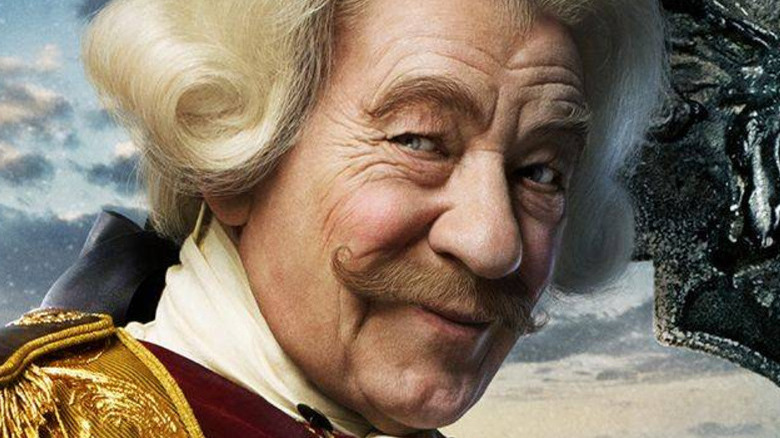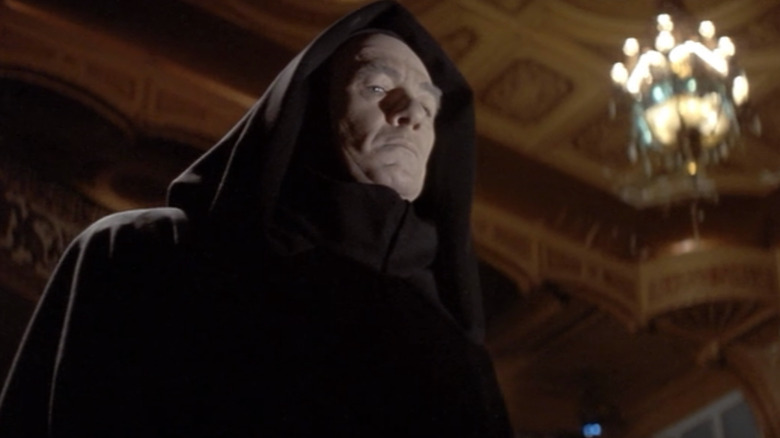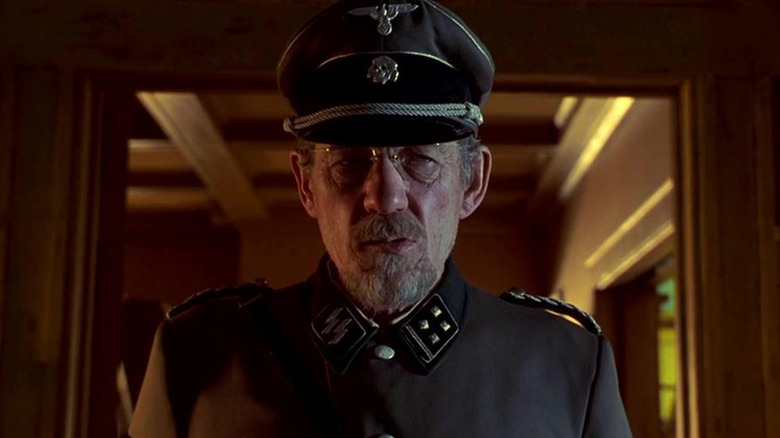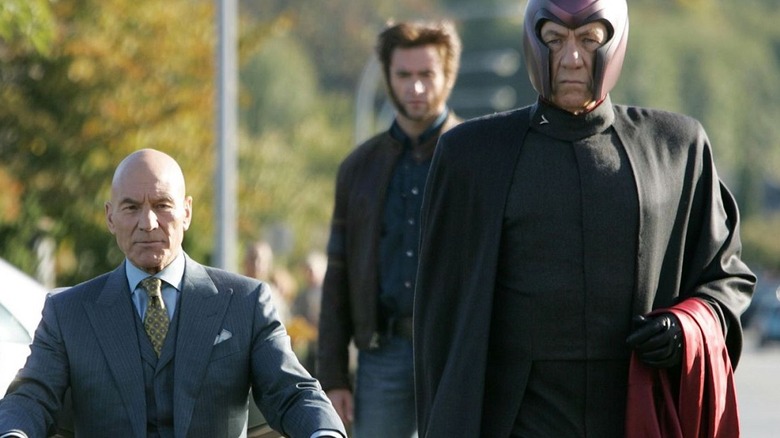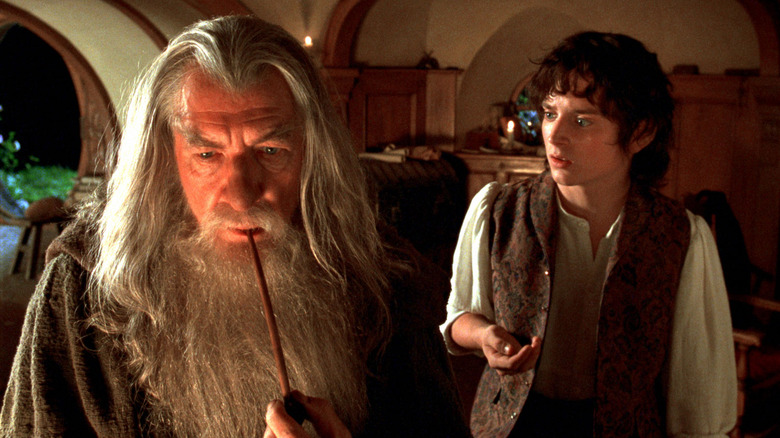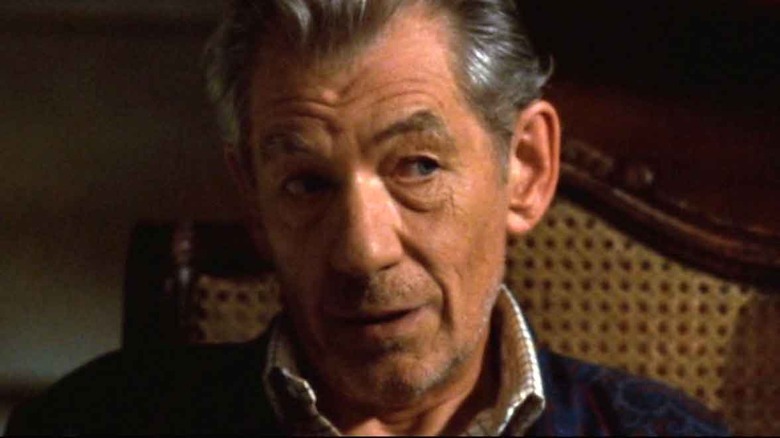Why Cogsworth From Beauty And The Beast Looks So Familiar
It's a tale as old as time: live-action remakes of classic Disney animated films. And by "old as time," we mean "as old as someone in their late 20s," since the first film to fit that mold was 1994's "The Jungle Book." In the time since — over a quarter century — we've gotten two remakes with dozens of spotted dogs, followed Alice through Wonderland and the Looking Glass, seen things from the villain's perspective in dealing with a gorgeous coma patient, and been blown away by Helena Bibbidi-Bobbidi-Bonham Carter — all of which led up to 2017's "Beauty and the Beast."
Premiering 25 years after the animated version hit screens, the "Beauty and the Beast" remake was directed by Bill Condon and set a high-water mark for Disney. Pulling in $1.25 billion at the worldwide box office, it marked the company's highest-grossing film live-action remake at the time (via The Numbers) —it was later eclipsed by the live-action version of "The Lion King" with $1.65 billion. It's a good thing the film brought in so much money, given that its reported $255 million production budget (via Forbes) put it among the most expensive films in history.
While the special effects seen in "Beauty and the Beast" surely cost a pretty penny, its all-star cast clearly contributed to the massive cost of the project as well. With Emma Watson and Dan Stevens as the title duo, as well as supporting turns from Emma Thompson, Ewan McGregor, Stanley Tucci, Luke Evans, Josh Gad, and Kevin Kline, to say the cast was stacked is a nearly criminal understatement. It also featured another well-known actor as Cogsworth, the Beast's hard-nosed chief of staff who's transformed into a clock. The character is played by acting legend Sir Ian McKellen, and here's why Cogsworth from "Beauty and the Beast" looks so familiar.
McKellen played the Grim Reaper in Last Action Hero
After absolutely killing it on the live stage — including winning a Tony Award for Best Actor for his performance in "Amadeus" — Sir Ian McKellen's film career started to take off as well, leading to his role as Death himself in 1993's fantasy-action flick "Last Action Hero," featuring "Terminator" star Arnold Schwarzenegger. The film follows the journey of young Danny Madigan (Austin O'Brien), a teen kid who lives with his single mother, Irene (Mercedes Ruehl), and finds comfort in action movies after his father's death. His favorite movies feature Schwarzenegger in the fictional "Jack Slater" blockbuster action film-within-a-film series. When Danny is gifted a golden movie ticket once owned by magician Harry Houdini by theater-owning friend Nick (Robert Prosky), he's transported into the reality of "Jack Slater IV." All of which sounds really cool until a secondary antagonist of the film, Mr. Benedict (Charles Dance) gets a hold of the ticket and brings several of Slater's villains into the real world.
Things get weird — okay, weirder — when Benedict and The Ripper (Tom Noonan) attack the "Jack Slater IV" premiere, aiming to take out Schwarzenegger appearing as himself, with stars like Schwarzenegger's real-life wife Maria Shriver, fellow action star Jean-Claude Van Damme, singer Little Richard, and Schwarzenegger's "Red Heat" co-star Jim Belushi making cameos as themselves. The Jack Slater-Schwarzenegger is critically wounded and Danny panics, which is when we meet Ian McKellen's character — Death, the Grim Reaper, as portrayed by Bengt Ekerot in Ingmar Bergman's "The Seventh Seal." Not to worry, he's not on hand to reap anyone; he's just wandered out of his own movie because he's curious why Jack's not on his list of people scheduled to die. He suggests Danny find the other half of the ticket in order to return Jack to the magical movie world, where his life-threatening injury will be just a flesh wound.
He played Nazi war criminal Kurt Dussander in Apt Pupil
Five years later, Ian McKellen appeared in a role perhaps even more frightening than the Grim Reaper — a Nazi war criminal living a secret life in suburban America. Such was his role in 1998's "Apt Pupil," a psychological thriller based on a Stephen King novella. The film starred Brad Renfro as Nazi-obsessed teenager Todd Bowden, who, as a result of his disturbing fascination, recognizes his neighbor Arthur Denker (McKellen) is in fact Kurt Dussander, a former major in the paramilitary SS in Nazi Germany, living in Southern California in 1984. Recognizing that Dussander is living under an assumed name as a fugitive fleeing prosecution for war crimes, Todd blackmails him, threatening to reveal his true identity in order to force him to tell him stories about the Holocaust; he even goes so far as to purchase Nazi regalia from a costume shop and have Dussander wear it, barking military commands at him. Being forced to recall the atrocities he committed four decades prior has a disturbing effect on Dussander and he becomes violent.
After trying to kill a cat in an oven and attacking a homeless person, Dussander has a heart attack. Todd manages to kill the hobo and calls an ambulance, though Dussander's hospital roommate, a concentration camp survivor, recognizes him and alerts authorities. Knowing his time living in secrecy is at an end, Dussander detaches his IV line and forces air into the tube with his mouth in order to cause an embolism, which kills him.
In an interview with IGN, McKellen described the role as "a part I didn't think I could play," though it wasn't the subject matter that was hard. "It was a fiendishly difficult accent – a Germanic/Californian mix."
Ian McKellen has played Magneto in several X-Men films
In 2000, Ian McKellen reunited with "Apt Pupil" director Bryan Singer for the first "X-Men" movie. While superhero films had been successful for more than two decades prior, the X-Men franchise helped bring them into the mainstream, making a mega-star out of actor Hugh Jackman — who took on the role of Logan aka Wolverine — in the process. The first film introduced audiences to the world of mutants, a human sub-species called homo-superior owing to the incredible gifts of those whose DNA contained genetic mutations. Charles Xavier (Sir Patrick Stewart) served as mentor and namesake for the titular team, a squad of mutant superheroes led by Scott Summers aka Cyclops (James Marsden), whose mutation allowed him to shoot powerful beams of light from his eyes. Joined by the telekinetic and telepathic Jean Grey (Famke Janssen), the weather-controlling Ororo Munroe aka Storm (Halle Berry), and a rather unenthusiastic Logan, the X-Men took on Xavier's nemesis Erik Lehnsherr aka Magneto (McKellen, whose powers of magnetism allowed him to warp, twist, and bend metal to his will.
Just like the serial nature of the comic book source material, the "X-Men" film franchise told the ongoing conflict between good and evil mutants as the former fought for acceptance within human society and the latter sought dominance over a race they deemed inferior. McKellen — who played Magneto in a total of five movies — was intrigued by the concept, telling IGN that the struggles mutants faced translated to those of other minorities, calling it an "interesting dilemma." "... In a sense, gay men are mutants, Jews are mutants... Any minority is likely to consider the argument between Xavier and Magneto. Do we integrate? Do we play down our differences? Do we assimilate? Do we appear normal? Or do we, in Magneto's view, declare our differences, be proud of them, and even prepare to fight the majority?"
McKellen played Gandalf the Gray in The Lord of the Rings and Hobbit trilogies
Perhaps even more notable than his role in the "X-Men" franchise, Ian McKellen also brought to life everyone's favorite wizard from Middle-Earth, Gandalf the Gray, in the "Lord of the Rings" and "Hobbit" trilogies. In the former, he aided hobbit Frodo Baggins (Elijah Wood) and the Fellowship of the Ring in their quest to destroy the One Ring to prevent the rise of the Dark Lord Sauron and save ... well, pretty much everything. In the latter, a prequel, he dragged Frodo's uncle Bilbo Baggins (Martin Freeman) into the quest to retake the Dwarven kingdom of Erebor in the Lonely Mountain from the gold-hoarding dragon Smaug, voiced by Benedict Cumberbatch, whose dedication to his craft is a wonder to behold. It's on this quest that Bilbo had initially found the One Ring, thereby unwittingly condemning his nephew to a great burden later in life. But really, it's all Gandalf's fault.
Of course, neither hobbit ventured alone in their respective tales; each was accompanied by Gandalf and a host of allies. Bilbo's quest made him part of a company of dwarves, led by Thorin Oakenshield (Richard Armitage), heir to the throne of Erebor. Frodo's cohorts were a bit more diverse, featuring an elf named Legolas (Orlando Bloom), a dwarf named Gimli (John Rhys Davies), and two men, including Aragorn (Viggo Mortensen), heir to the throne of Gondor — that's of course in addition to his trusty best friend and gardener, Samwise Gamgee (Sean Astin), cousin Peregrin Took (Billy Boyd), and friend Meriadoc Brandybuck (Dominic Monaghan).
McKellen noted in an Empire interview that he has several souvenirs from his time making the "Lord of the Rings" movies. "I keep [Gandalf's sword] Glamdring in my hatstand and the pointy hat in the basement, often worn by visiting youngsters. Gandalf's staff is behind the bar in my Thames-side pub The Grapes, in East London. Don't tell Peter, but the keys to Bag End are hanging up at home.
He plays an expert on the Holy Grail in The Da Vinci Code
In 2006, acclaimed director Ron Howard adapted the first of Dan Brown's three Robert Langdon novels to make it to the big screen — "The Da Vinci Code." Actor Tom Hanks took on the role of the Harvard professor whose expertise in the fictional realm of symbology has taken him around the world to solve historical mysteries and put him on the radar of religious secret societies everywhere. Hanks reprised his role as Langdon in 2009 for "Angels & Demons" and again in 2016 for "Inferno."
Ian McKellen only appeared in the first film as Langdon's friend, Sir Leigh Teabing, a historian and expert on lore surrounding the Holy Grail. After Langdon is brought into the investigation of a murder at the Louvre, he and police cryptologist Sophie Neveu (Andrea Tautou) quickly finds themselves at odds with the Priory of Sion and Opus Dei, two obscure orders of the Catholic church. The reason? As Teabing explains, the Holy Grail has been historically depicted as a chalice from which the historical Jesus Christ drank; in "The Da Vinci Code," the grail is actually a vessel — a womb, to be specific — that contains the sacred bloodline of Jesus. They posit that Mary Magdalene was not a prostitute, as written in the accepted gospels, but Jesus' wife and the bearer of his children. Teabing is also revealed to be the grandmaster of the movie's overarching conspiracy, an attempt to bring down the Catholic Church.
The film received its fair share of controversy, namely from the real-world Catholic Church, controversy of which McKellen was aware. "The people who go and see movies, their minds aren't quite as finely tuned as those who read a book. Is that what the Vatican is thinking? Therefore they have to be protected from what they see? I don't approve of censorship," he told IGN. "They should just accept that this is a fictional thriller, but Dan Brown may claim more of it."
